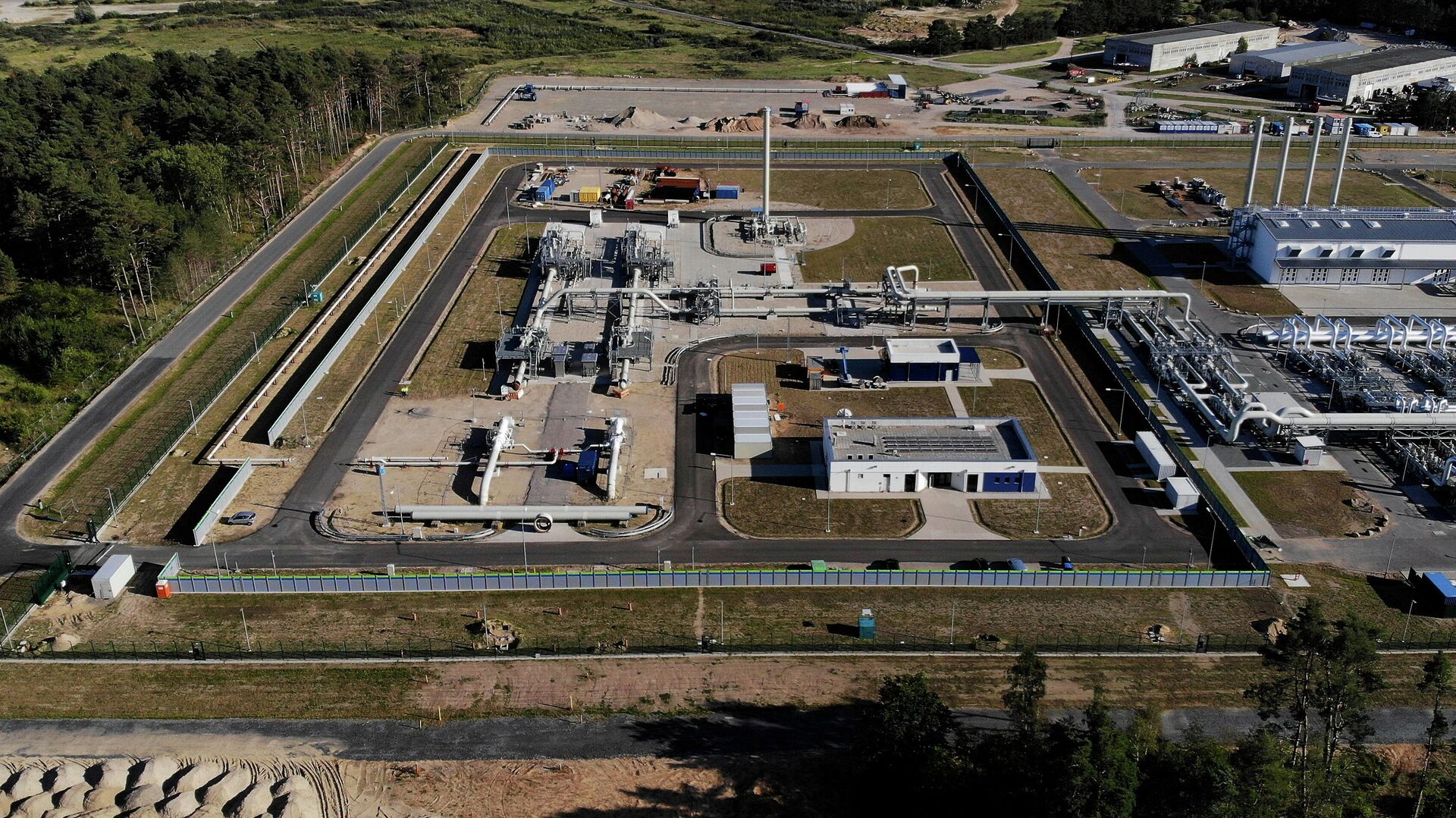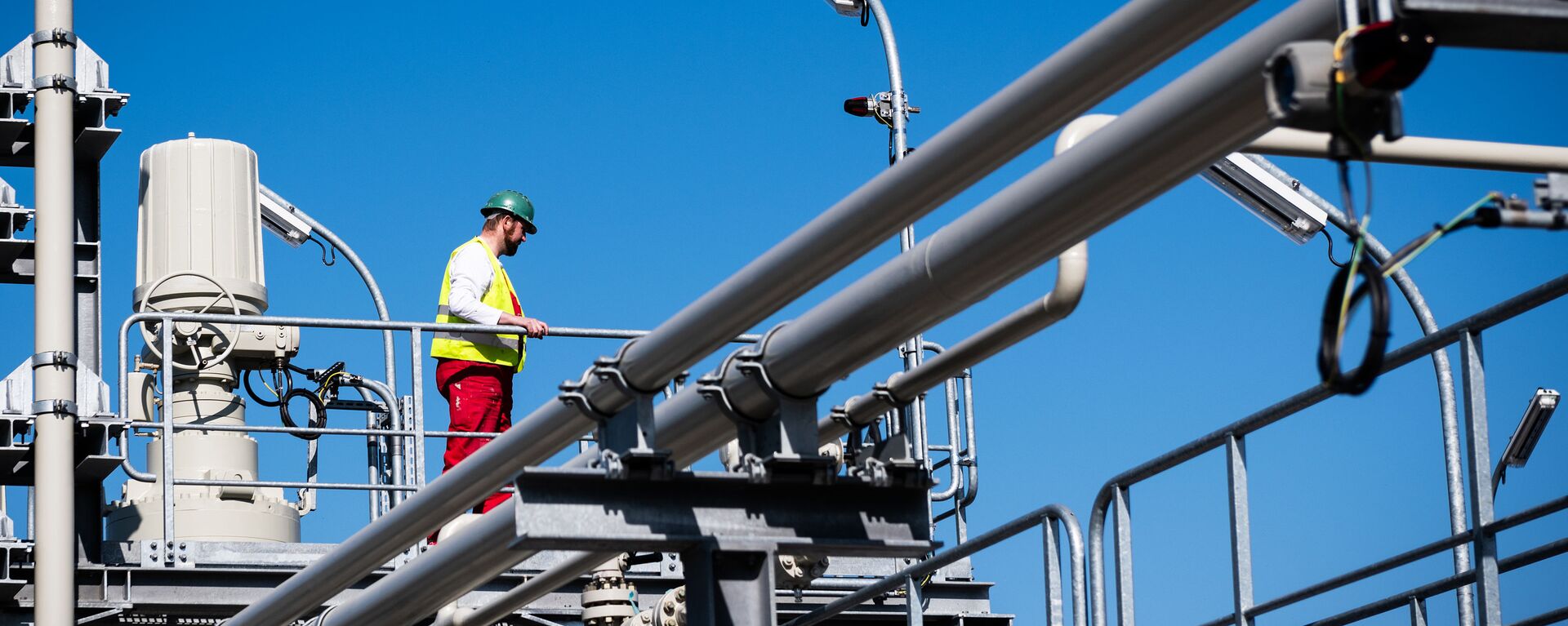https://sputnikglobe.com/20211230/germany-doesnt-rule-out-new-sanctions-against-nord-stream-2-1091917968.html
Germany Doesn't Rule Out New Sanctions Against Nord Stream 2
Germany Doesn't Rule Out New Sanctions Against Nord Stream 2
Sputnik International
German Vice Chancellor and Federal Minister for Economic Affairs and Climate Action Robert Habeck has made it clear that he doesn't rule out new sanctions against Nord Stream 2
2021-12-30T13:51+0000
2021-12-30T13:51+0000
2022-10-19T21:19+0000
russia
ukraine
sanctions
germany
military conflict
approval
gas pipeline
project
us
nord stream 2
https://cdn1.img.sputnikglobe.com/img/07e5/0c/1e/1091912983_70:0:3480:1918_1920x0_80_0_0_ed44b0796599116d4bbf4bc7b84ccf0f.jpg
German Vice Chancellor and Federal Minister for Economic Affairs and Climate Action Robert Habeck has made it clear that he doesn't rule out new sanctions against Nord Stream 2. He also signalled Berlin's unwillingness to interfere in the process of approving the project."We are a constitutional state, and permits are granted in accordance with the law. Politicians should focus on the political sphere", the minister told the German network ZDF on Thursday.Kiev and several Western countries have been accusing Moscow of planning "an invasion" of Ukraine because Russia deployed troops near its southwestern borders. Moscow rejects the accusations and insists that the West wants to use them as an excuse to deploy NATO military equipment in Russia's backyard.At the same time, the vice chancellor called on Europe to "use its own formats and chances" to conduct a dialogue with Moscow, including via the Normandy format and the Russia-NATO Council.On Thursday, Russian Foreign Ministry spokeswoman Maria Zakharova confirmed that a gathering of the Russia-NATO Council is due on 12 January.Normandy Four Format The so-called Normandy Four format, comprised of Russia, Ukraine, France, and Germany, was established on 6 June 2014, in order to resolve a military conflict between Kiev and the self-proclaimed republics in the country's eastern region of Donbass.The Donbass standoff erupted in 2014, when Ukrainian authorities launched a military operation against the self-proclaimed Donetsk and Lugansk People's Republics that refused to recognise the new government in Kiev, which came to power after what they considered to be a coup.In 2015, the conflicting parties signed a peace deal following talks brokered by the Normandy Four. The agreements have repeatedly been breached, with both sides accusing each other of the violations.Nord Stream 2 Yet to Be Okayed by German RegulatorsAs for Habeck’s interview, it comes after the German government reportedly urged US congressmen last month not to impose sanctions on the Nord Stream 2 pipeline, insisting that doing so will "damage transatlantic unity".Washington previously imposed a number of sanctions on the project, arguing that once Nord Stream 2 is operational, Europe will become even more dependent on Russia's energy resources, something that will allegedly help Moscow gain political leverage.Russia has repeatedly warned against politicising what it says is a purely economic project, adding that the way in which the White House has expressed opposition to Nord Stream 2 is an example of unfair competition. The already completed pipeline is awaiting clearance from German and European regulators before Russia can start exporting gas through it, a process that is expected to wrap up by mid-2022.
https://sputnikglobe.com/20210721/ukraine-would-be-at-more-risk--without-us-german-nord-stream-2-deal-senior-us-official-says-1083432378.html
ukraine
germany
Sputnik International
feedback@sputniknews.com
+74956456601
MIA „Rossiya Segodnya“
2021
Oleg Burunov
https://cdn1.img.sputnikglobe.com/img/07e4/09/0b/1080424846_0:0:2048:2048_100x100_80_0_0_3d7b461f8a98586fa3fe739930816aea.jpg
Oleg Burunov
https://cdn1.img.sputnikglobe.com/img/07e4/09/0b/1080424846_0:0:2048:2048_100x100_80_0_0_3d7b461f8a98586fa3fe739930816aea.jpg
News
en_EN
Sputnik International
feedback@sputniknews.com
+74956456601
MIA „Rossiya Segodnya“
Sputnik International
feedback@sputniknews.com
+74956456601
MIA „Rossiya Segodnya“
Oleg Burunov
https://cdn1.img.sputnikglobe.com/img/07e4/09/0b/1080424846_0:0:2048:2048_100x100_80_0_0_3d7b461f8a98586fa3fe739930816aea.jpg
nord stream 2 gas pipeline project, possible new sanctions against nord stream 2, german and eu regulators, germany, us, russia
nord stream 2 gas pipeline project, possible new sanctions against nord stream 2, german and eu regulators, germany, us, russia
Germany Doesn't Rule Out New Sanctions Against Nord Stream 2
13:51 GMT 30.12.2021 (Updated: 21:19 GMT 19.10.2022) The now-completed Nord Stream 2 gas pipeline, which is prepared to start pumping gas from Russia to Germany under the Baltic Sea, still needs the approval of German and European regulators, who threatened to put off certification until mid-2022.
German Vice Chancellor and Federal Minister for Economic Affairs and Climate Action Robert Habeck has made it clear that he doesn't rule out
new sanctions against Nord Stream 2. He also signalled Berlin's unwillingness to interfere in the process of approving the project.
"We are a constitutional state, and permits are granted in accordance with the law. Politicians should focus on the political sphere", the minister told the German network ZDF on Thursday.
Yet, he went on to say that "in light of the situation in eastern Ukraine and the [alleged] buildup of Russian troops there, [it may] be necessary to make a political decision on what sanctions should be imposed [against Russia] under certain circumstances if the situation results in a hot conflict again".
Kiev and several Western countries have been accusing Moscow of planning "an invasion" of Ukraine because Russia deployed troops near its southwestern borders. Moscow rejects the accusations and insists that the West wants to use them as an excuse to deploy NATO military equipment in Russia's backyard.
Habeck, for his part, welcomed the Moscow-Washington talks on Ukraine slated for 10 January, stressing that if the United States and Russia talk to each other, "it's only good".
At the same time, the vice chancellor called on Europe to "use its own formats and chances" to conduct a dialogue with Moscow, including via the Normandy format and the Russia-NATO Council.
On Thursday, Russian Foreign Ministry spokeswoman Maria Zakharova confirmed that a gathering of the Russia-NATO Council is due on 12 January.
The so-called
Normandy Four format, comprised of Russia, Ukraine, France, and Germany, was established on 6 June 2014, in order to resolve a military conflict between Kiev and the self-proclaimed republics in the country's eastern region of Donbass.
The Donbass standoff erupted in 2014, when Ukrainian authorities launched a military operation against the self-proclaimed Donetsk and Lugansk People's Republics that refused to recognise the new government in Kiev, which came to power after what they considered to be a coup.
In 2015, the conflicting parties signed a peace deal following talks brokered by the Normandy Four. The agreements have repeatedly been breached, with both sides accusing each other of the violations.
Nord Stream 2 Yet to Be Okayed by German Regulators
As for Habeck’s interview, it comes after the German government reportedly urged US congressmen last month not to impose sanctions on
the Nord Stream 2 pipeline, insisting that doing so will "damage transatlantic unity".
Washington previously imposed a number of sanctions on the project, arguing that once Nord Stream 2 is operational, Europe will become even more dependent on Russia's energy resources, something that will allegedly help Moscow gain political leverage.
Russia has repeatedly warned against politicising what it says is a purely economic project, adding that the way in which the White House has expressed opposition to Nord Stream 2 is an example of unfair competition. The already completed pipeline is awaiting clearance from German and European regulators before Russia can start exporting gas through it, a process that is expected to wrap up by mid-2022.




